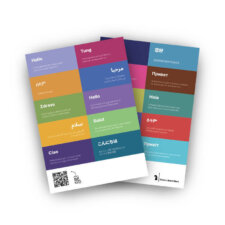Political power should not be concentrated on few individuals or bodies. For this reason, state power in Switzerland and the cantons is divided among three independent powers: the legislative power, the executive power and the judiciary power. In Canton Basel-Stadt, the following authorities exercise these powers:
- Legislative power: Cantonal Parliament (Grosser Rat) (100 members, elected by the public every four years)
- Executive power: Cantonal Government (Regierungsrat) (7 members, elected by the public every four years)
- Judiciary power: Various courts (Gerichte) at the cantonal level
Basel-Stadt has a special characteristic: the parliament, the government and the courts of Canton Basel-Stadt are also responsible for the city commune of Basel. The two communes of Riehen and Bettingen also have a legislative body (Communal Parliament, Einwohnerrat) and an executive body (Communal Council, Gemeinderat).
At the federal level, the legislative power is split among two chambers: the national government and the council of states (Nationalrat und Ständerat). The national government (7 members) is called the Federal Council (Bundesrat). On the national level, there are various courts. The Federal Tribunal is the highest instance where, for example, appeals against cantonal rulings can be made.



